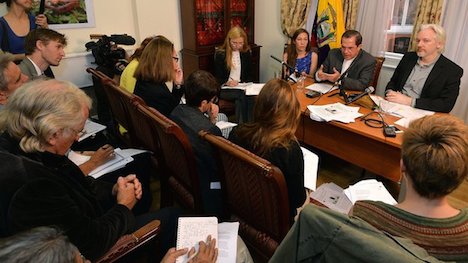|

|
|
By Staff Writers, BBC
BBC Newsworld
Monday, Aug 18, 2014
 |
| Mr Assange was speaking inside the Ecuadorean embassy, where he has been living for the last two years |
Wikileaks founder Julian Assange has suggested he will be leaving London's Ecuadorean embassy "soon". Wikileaks spokesman Kristinn Hrafnsson said Assange would be "leaving the embassy" after two years' refuge but gave no more details.
Mr Assange is wanted for questioning over alleged sex assaults in Sweden and faces arrest if he leaves the embassy.
Mr Hrafnsson later said the plan "as always" was for Mr Assange to depart when the UK "calls off the siege".
"The world is not coming to an end," Mr Hrafnsson told reporters inside the embassy. "The plan, as always, is to leave as soon as the UK government decides to honour its obligations in relation to international agreements."
Mr Assange, 43, faces questioning by prosecutors in Stockholm over claims made by two women in 2010. He denies the allegations and sought refuge in the Ecuadorean embassy in June 2012 shortly after the UK's Supreme Court dismissed his efforts to block his extradition.
Since then police have maintained a round-the-clock presence outside the building, in London's Knightsbridge.
Diplomatic solution
Clive Coleman, the BBC's legal correspondent, said that nothing had changed since 2012 and Mr Assange would be arrested and extradited if he left the embassy.
Speaking at the news conference, Mr Assange said: "I understand that Kristinn Hrafnsson has said that he can confirm I am leaving the embassy soon".
But he added it was not because he needed medical treatment, as had been reported in some of the UK press.
Clarifying Mr Assange's comments, Mr Hrafnsson said: "The plan is for him to leave as soon as the UK government decides to honour its obligations in relation to international agreements and calls off the siege outside - it's as simple as that."
A UK Foreign Office spokesman called on the Ecuadorean government to help "bring this difficult and costly situation to an end".
"We remain as committed as ever to reaching a diplomatic solution to this situation. We are clear that our laws must be followed and Mr Assange should be extradited to Sweden," the spokesman added.
'Bound to fail'
Mr Assange says he fears he could eventually be handed over to the US because Wikileaks published classified US military documents on the Afghan and Iraq wars.
He was granted asylum by Ecuador in August 2012 and the country's foreign minister Ricardo Patino said he would continue to be offered "protection".
Sitting next to Mr Patino at a news conference, Mr Assange said his health had suffered during his time inside the embassy.
Reports in UK newspapers at the weekend said Mr Assange had developed a heart defect and a chronic lung condition during his confinement.
The Australian said the reasons for him leaving were not those "reported by the Murdoch press" - but did not elaborate further.
Correspondent Clive Coleman added that if Mr Assange needs medical treatment he could be arrested and then taken to hospital under guard.
He said that any argument that Mr Assange could not be extradited because of his health was "almost certainly bound to fail".
"It is almost inconceivable that an extradition would be halted on health grounds if that extradition is to a country that is part of the European Arrest Warrant scheme.
"All of those countries have good hospitals and health care facilities. The health issue doesn't open upon up a new round of domestic legal challenges," he said.
'Better climate'
Speaking at the news conference, Mr Patino said the Ecuador government would attempt to meet UK Foreign Secretary Philip Hammond to discuss the case.
He said changes to the UK's extradition laws had created a better climate for reaching a deal over Mr Assange.
"It is time to free Julian Assange. It is time for his human rights to be finally respected," Mr Patino added.
The Swedish warrant for Mr Assange's arrest was first issued at the end of 2010. Last month, a Stockholm court ruled it should stay in place.
It comes as the Metropolitan Police has estimated the total cost of policing the embassy since June 2012 has been £6.4m - including £1.1m of police overtime.
Source URL
|
 Print This Print This

|
If you appreciated this article, please consider making a donation to Axis of Logic.
We do not use commercial advertising or corporate funding. We depend solely upon you,
the reader, to continue providing quality news and opinion on world affairs. Donate here
|
 |
Featured

|

